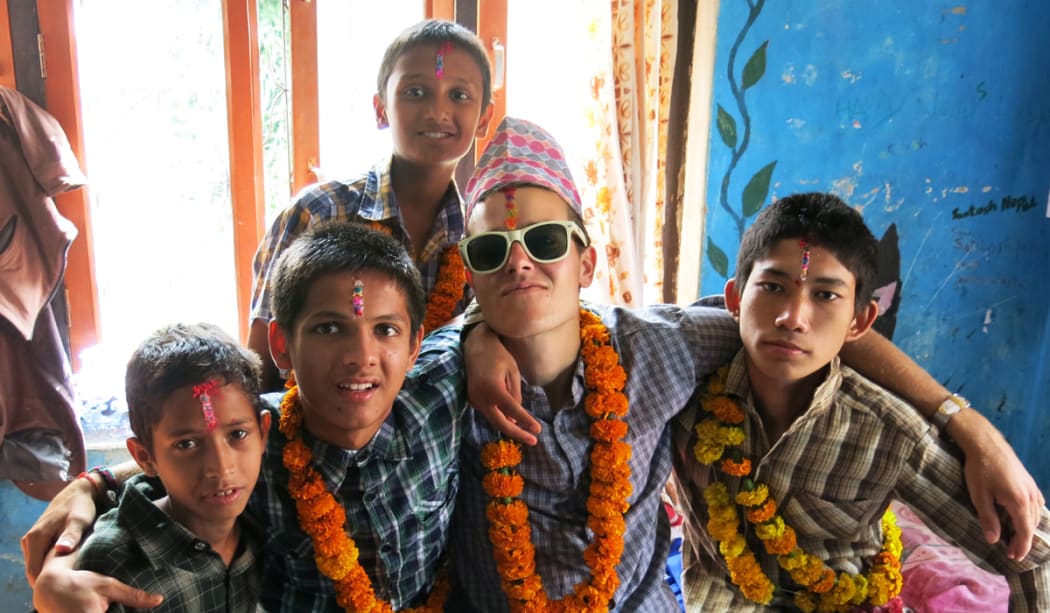Between power outages and harvesting rice, Aucklander Lex Edmonds, 19, is on a 10-month volunteer placement working in a nursery helping to cultivate fruit and vegetables and other plants for an orphanage in Nepal.
When he's not trying to figure weeds from flowers and hanging out with the teenage orphans, he is sitting on one of Nepal's hundreds of substandard buses, seeing the sites, but also keeping his fingers crossed he'll get home in one piece.

Lex Edmonds at an orphanage in Rampur, Nepal. Photo: Supplied
What brought you to Nepal?
It started with talking to a careers advisor at school, to try to find some direction – everything I was interested in came down to civil or volunteer work ...There were so many countries I think I would have enjoyed and could have learnt from, but at the back of my head I had a voice saying Sir Edmund Hilary and Nepal, which I learnt a bit about at primary school.
Nepal to me seemed like an intriguing country I didn't know much about so I just chose it.
What are some of the biggest differences to your life there and at home?
I'm a bit over the public transport. It's a bit of an experience in itself, but you can't sit there with a negative attitude, that's how its done in Nepal – very crowded, always over capacity, every space is money. So they cram them literally right to the roof, sometimes you are sitting on the roof.
The roads are not well maintained. There's often potholes or debris on the road. They are narrow and often dramatic in areas where the cliffs are inches away from where the road finishes.
I just try to find the best place to sit to get out the window – I've seen a few wreckages on the side of the road.
How about your day-to-day?
I wake up around six, have morning chia – a really ridiculously sweet tea – then I start work at seven.Then finish at ten, have a break. In my break maybe help around the house, like take rice to the rice mill. But more often I read for a few hours then at three start work again till six, then come back.
If the internet is on then I will see what's happening back in New Zealand, or I'll just have a lot of time to myself to think, which was terrifying at first.
This is where I start to sound really cliché and cheesy, but I am starting to find myself.
The traditional food is called dal bhat. It's rice, lentils, pickles on the side and a curry. It's really tasty.
You eat with your hands. That was a contradiction to what I was taught at home – not to play with food or eat with your hands ... You eat twice a day at 10am and 7.30pm. At first I was hungry quite often but now the food is substantial. It goes a long way.
Everybody in the community where I am is harvesting rice at the moment. It's a culture shock seeing how much they still live off the land as a source of income and a source of food.
They don't really go to the grocery store to buy their food; they grow it all themselves and they eat what they can grow. The idea of owning land is very important and very much part of their daily lives.
If I go to the local bazaar and go buy a bag of apples or a chocolate bar that's (seen as) very uncommon because fruit, chocolate and biscuits are luxury items for most families.
A couple of times I would want to sit down and eat an ice-cream but I would get so much attention because they would see me eating an ice-cream and they would think "oh, this person has a lot money". That's a shock, being perceived as a quite wealthy person.
So, what are you learning then? A lot of people go to Nepal to find themselves, are you one of them?
This is where I start to sound really cliché and cheesy, but I am starting to find myself.
There's a saying "live everyday like it's your last". To me that's not a new saying – I've grown up hearing it – but in New Zealand, surrounded by the same comforts and same habits, I'd think "that's a nice idea, I'll try live like that" but then I'd quickly go back to the old routines and forget it.
Now I'm all the way in Nepal, a completely different culture and lifestyle, away from family and friends.
With the homesickness I am appreciating you have to live everyday like it's your last – this is with the help of the public transport.
Life's too short to spend precious moments with loved ones bickering, fighting, or being negative. I've realised how lucky I am, and how lucky everyone is at home.
This content is brought to you with funding assistance from New Zealand On Air.

